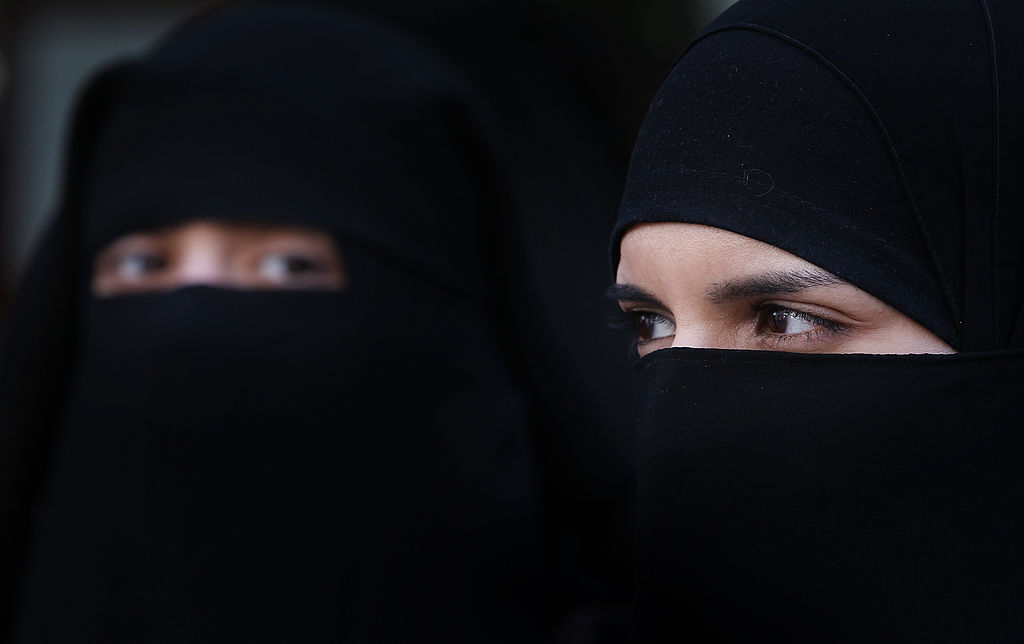Robert Jenrick, the shadow justice secretary, has expressed his support for Britain banning the burqa. ‘I probably would ban the burqa… There are basic values in this country and we should stand up and defend them, and… whether it’s sharia courts or wearing of the burqa, these are issues we’re going to have to confront,’ Jenrick said on Talk TV, while discussing the growing number of European countries outlawing the burqa, with Italy introducing a bill this month.
If Britain were to pass a law banning face coverings, it is Muslim women who would be the first to benefit
The laws in place in European countries such as France, Switzerland, Austria and others are religiously neutral and applicable to all face coverings, from masks to balaclavas. Calling these laws ‘burqa bans’ is misleading, since what they effectively do is undo the exception that burqa has had on religious and cultural grounds. In Italy, for instance, there has been a ban on face coverings that hide your identity since 1975 as part of anti-terror laws, with the recently introduced bill removing religious exceptions. Any legislation in Britain is likely to be aimed at all face coverings as well, due to the obvious security threat they pose, with jihadist groups often using the burqa in their terror raids to conceal explosive material and hide their identities.
These laws in Europe are predictably deemed ‘Islamophobic’, even though over ten Muslim-majority countries, from Algeria to Bosnia, ban the burqa, with Muslim councils in Tajikistan and Kyrgyzstan deeming it ‘alien to our society’. An overwhelming number of women wearing the burqa around the world are forced to adhere to strict Islamic or tribal codes, and naturally rarely participate in public life. Muslim women have been the first to benefit from the undoing of Islamist totalitarianism, including in Albania which was one of the first countries in the world to ban the face veil in 1937. Meanwhile, in Turkey, long considered a beacon of secular egalitarianism in the Muslim world, women’s rights have plummeted, with a rise in femicides following the undoing of its decades-old prohibition of Islamic veils and head coverings in public institutions.
Islamist face coverings are designed to uphold allegiance to Islamic doctrine. Its sexist codes have long been used to subjugate Muslim women, with the burqa quite evidently erasing women’s identities. British Muslim women wearing these items are symptomatic of the larger Islamist stranglehold over the Muslim community, especially of women and girls. Underage British Muslim girls are being forced into marriage by British imams performing the Islamic nikkah. Around a third of British Muslim women in unregistered marriages are unaware that they cannot benefit from laws such as the Divorce (Religious Marriages) Act 2002, for financial and other safeguards in a divorce. As a result, a huge number of British Muslim women continue to be controlled by their families, with the help of sharia courts that uphold sexist Islamic mandates.
Following his support for a burqa ban, Jenrick has been condemned for espousing ‘anti-British’ values. ‘That’s so anti-British. It goes against what our nation stands for,’ noted Labour MP Sam Rushworth. Those condemning these laws appear to suggest that Britain stands for the Islamist erasure of women.
Those who defend the burqa describe it as a ‘choice’. Yet there is little point introducing digital ID or having security cameras, if some citizens can ‘choose’ not to follow the law and keep their faces hidden on religious grounds.
For many, it seems it is ‘British’ to endorse Islamic separatism in the name of ‘multiculturalism’. Meanwhile, numerous Muslim-majority countries continue to insist the burqa isn’t part of their culture. Even Islamic scriptures do not make face coverings mandatory. It is no wonder there is a growing perception in the rest of the world that some British Muslims have become more radicalised than citizens of many Islamic countries. Hardline Islamists claim to be representatives of the entire religious community in Britain, with these extreme attitudes being tolerated for the sake of ‘inclusivity’.
If Britain were to pass a law banning face coverings, it is Muslim women who would be the first to benefit. It would be a step towards undoing antediluvian Islamist mandates on women. And the refusal to allow Islamic exceptionalism would be a clear sign that the law supersedes religious doctrine for all citizens. Only then can there be actual inclusivity, and equality before the law in Britain.







Comments